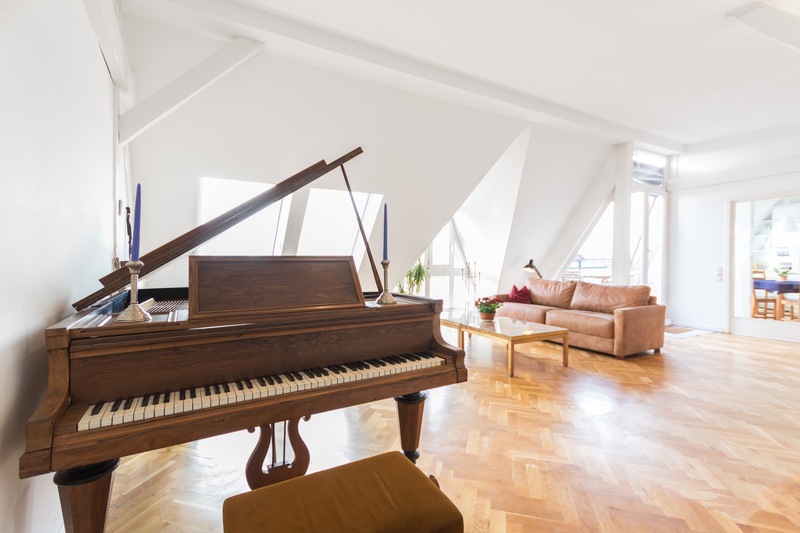Beat the Heat: Essential Tips for Protecting Your Piano from Summer Humidity

As the summer heat ramps up, so does the humidity—a potential hazard for one of your home’s most cherished items: your piano. Whether you own a grand piano that’s the centerpiece of your living room, or an upright that serenades the hallways, maintaining the right environment is crucial to your instrument's longevity and performance. In this blog, we will delve deep into how humidity affects pianos and provide comprehensive tips on safeguarding your piano against the adverse effects of summer humidity.
Understanding the Impact of Humidity on Pianos
Before we can protect our pianos, it's essential to understand why humidity is a significant concern. Pianos are primarily made of wood, which naturally responds to environmental changes. Wood absorbs moisture when the humidity is high and dries out when it’s low. This expansion and contraction can wreak havoc on several components of the piano.
The Soundboard
The soundboard, a crucial part of your piano, is highly sensitive to changes in humidity. This thin piece of wood helps project the sound from the piano strings and can either swell with excess moisture or contract when too dry, affecting both the sound quality and tuning stability.
The Piano Action
The action, the mechanism behind the keys of the piano, consists of thousands of parts, many of which are also wooden. High humidity can cause these parts to swell and stick, leading to sluggish response or mechanical noise. Conversely, low humidity may lead to cracks and misalignment.
Tuning Stability
Humidity fluctuations directly impact the tuning pins where the strings are wound. Increased humidity causes the piano's wooden structure to swell, putting more tension on the strings and altering the pitch. Regular fluctuations make it challenging to keep a piano properly tuned.
Strategies for Managing Humidity
Keeping your piano in tune and in good health isn’t just about playing it regularly; it's also about maintaining the right environment around it. Here’s how you can manage indoor humidity effectively:
Use a Hygrometer
Start by measuring the humidity levels in your piano room with a hygrometer. This inexpensive tool will help you keep tabs on the current humidity levels. The ideal humidity level for pianos is between 40% and 60%.
Control Room Humidity
If you find that the humidity levels in your piano room are too high, consider using a dehumidifier to remove excess moisture from the air. Conversely, in dry conditions, a humidifier can add the necessary moisture. It’s crucial to use these tools effectively by placing them in appropriate locations within the room, not directly next to the piano, to avoid localized humidity effects.
Air Conditioning and Ventilation
Maintain a stable indoor temperature and humidity using air conditioning. Air conditioners remove moisture from the air and help keep the environment consistent, which is vital for piano maintenance. Ensure good air circulation but avoid placing the piano where it will be in the direct flow of air conditioning or heating vents.
Room Selection
Where you place your piano in your home can impact how well it fares in different climates. Avoid placing your piano against an exterior wall where temperature and moisture fluctuations are most significant. Interior walls are preferable. Also, keep the piano away from windows, doors, and direct sunlight to avoid sudden changes in temperature and exposure to elements.
Piano Covers
Using a piano cover when the instrument is not in use can help protect it from dust and minor fluctuations in humidity. For grand pianos, consider using a string cover underneath the lid to provide additional protection for the internal mechanism.
Regular Maintenance
Schedule regular maintenance with a professional piano technician. Seasonal check-ups can help ensure that any issues caused by humidity changes are caught early and addressed promptly. Technicians can also install humidity control systems directly in your piano, such as the Dampp-Chaser, which regulates the environment around the clock.
Climate-Controlled Storage
If you’re planning to be away for an extended period, or if controlling the climate in your home is challenging, consider moving your piano to a climate-controlled storage facility. These facilities maintain stable conditions year-round and can be an excellent option for ensuring your piano’s safety during extreme weather months.
Protecting your piano from the effects of summer humidity is crucial for its maintenance and longevity. By understanding the impacts of humidity, using the right tools to monitor and adjust the moisture levels in your home, and ensuring regular maintenance, you can keep your piano in optimal condition year-round. Remember, a well-cared-for piano not only sounds better but also holds its value longer, making these efforts a worthwhile investment in your musical enjoyment.
If you're seeking professional help in moving or storing your piano, especially during the tricky summer months,
Modern Piano Moving is here to assist you. With our expert services, we ensure your piano is transported safely, and maintained in climate-controlled environments that meet all the necessary conditions for preserving your instrument's integrity. We also offer an affiliate system for piano teachers and technicians. Connect with us today to learn more about how we can help you beat the heat and keep your music playing beautifully all summer long!
Bookmark & Share
User Comments
Be the first to comment on this post below!
Previous Article
Most Popular Articles
- How Much Does It Cost to Move a Piano Long Distance?
- How Heavy Is A Grand Piano?
- Easy Pop Songs to Play on the Piano
- The Best Spots for Your Piano
- Mistakes to Avoid When Moving a Piano
- How to Restore Yellow Piano Keys
- 10 Reasons to Hire a Professional Piano Moving Company
- What to Do with Your Unused Piano



